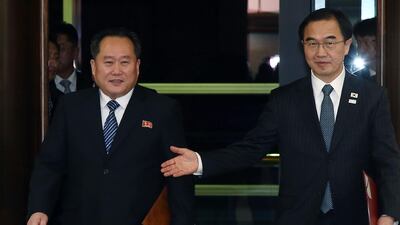North Korea said after its first talks with South Korea in more than two years that it would not discuss its nuclear weapons with Seoul because they were aimed only at the United States, not its “brethren” in South Korea.
In a joint statement after 11 hours of talks on Tuesday, North Korea pledged to send a large delegation to next month’s Pyeongchang Winter Olympics in South Korea but made a “strong complaint” after Seoul proposed talks to denuclearise the Korean peninsula.
Officials from both sides said they agreed to meet again to resolve problems and avert accidental conflict, amid high tension over North Korea’s program to develop nuclear missiles capable of hitting the United States, but Pyongyang said disarmament would not be part of the discussions.
“All our weapons, including atomic bombs, hydrogen bombs and ballistic missiles are only aimed at the United States, not our brethren, nor China and Russia,” Pyongyang’s chief negotiator, Ri Son-gwon, said.
“This is not a matter between North and South Korea, and to bring up this issue would cause negative consequences and risks turning all of today's good achievement into nothing,” Mr Ri, chairman of the North’s Committee for the Peaceful Reunification of the Fatherland, warned in closing remarks.
US president Donald Trump and North Korean leader Kim Jong-un have exchanged threats and insults in the past year, raising fears of a new war on the peninsula.
The US state department gave a cautious welcome to the talks between Seoul and Pyongyang.
But the welcome was hedged with concern that the slight thaw in ties between the historic foes would represent an opening for Kim’s regime to escape its diplomatic isolation.
“The United States remains in close consultations with ROK [South Korea] officials, who will ensure North Korean participation in the Winter Olympics does not violate the sanctions imposed by the UN Security Council over North Korea’s unlawful nuclear and ballistic missile programs,” spokeswoman Heather Nauert said.
As president Trump “said to ROK president Moon [Jae-in] on January 4, the United States is committed to a safe and successful Winter Olympic Games, and the United States will send a high-level presidential delegation to the Games,” she said.
“During the same conversation, the two leaders also agreed to continue the campaign of maximum pressure on North Korea toward the goal of complete and verifiable denuclearisation of the Korean peninsula.”
The White House did not immediately comment on the United States being the only potential target of North Korea’s nuclear weapons.
The United States, which has 28,500 troops stationed in South Korea as a legacy of the 1950-1953 Korean War, initially responded coolly to the idea of inter-Korean meetings, but Trump later called them “a good thing” and said he would be willing to speak to Kim.
“At the appropriate time, we’ll get involved,” Mr Trump said on Saturday, although US-North Korean talks appear unlikely, given entrenched positions on both sides.
The United States – which has warned that all options, including military ones, are on the table in dealing with North Korea – insists that any future talks must have the aim of denuclearisation, and the North-South thaw has not altered the US intelligence assessment of North Korea’s weapons programs.
China's foreign ministry said it was happy to see talks between North and South Korea and welcomed all positive steps. Russia echoed the sentiment, with a Kremlin spokesman saying: “This is exactly the kind of dialogue that we said was necessary.”
International Olympic Committee (IOC) president Thomas Bach called the talks “a great step forward in the Olympic spirit” and said the IOC would await official proposals on the number and names of athletes from the North and such matters as flag, anthem and ceremonies.

